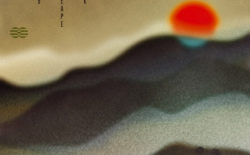Available on: Hyperdub CD/LP/digital
In the last few years Hyperdub has been instrumental in creating an unfixed scene, full of colour. For their second album Black Sun, however, label boss Kode9 and his longtime vocal collaborator Spaceape choose to go a different way, taking the warmth of these developments and making them colder. It’s a worthy attempt, and a worthwhile snapshot of their current interests, but what colour is provides the album’s most exciting and progressive moments.
Kode9’s strength has always been in pulse, going beyond simply interesting or complex drum programming to create something bodily engaging. Black Sun is full of this; fractured garage grooves and pitched stabs shuffle, wild, Krupa-like snare s drive relentlessly, and the several funky-tempo numbers have a natural, samba-ish looseness that’s particularly satisfying.
However, against all this his use of detuned sawtooth and pulsewaves is in danger of becoming a cliché. The rising and falling delayed zaps of ‘Black Smoke’, the high register melody in ‘Love Is The Drug’ and the clumsy synth brass fanfare of ‘Kryon’ (ft. Flying Lotus) are all rather Forbidden Planet. Thematically too, the ‘dystopian image of the future’ theme of the duo’s work gets pushed to its limits. ‘Am I’, as the heaviest example of this, is also the weakest cut on the album; a grime-dubstep number whose synths sound cheap and whose lyrics simply consist of a list of paradoxes that fail to go anywhere meaningful. Spaceape’s aggressive deliveries are not as engaging as his more world-weary reflections, and this album doesn’t boast many of the latter.Cha Cha’s female voice is therefore very welcome as a counterpart, but she is largely hidden in the rugged folds of Kode’s productions.
It is instead unfamiliar material that is Black Sun’s strength. Kode9 unexpectedly goes New York house with ‘Black Sun (Partial Eclipse Version)’, providing an alternative of the groundbreaking 2009 single that’s less lean but still fresh; its more obviously metropolitan sound complimentary to the album’s direction. As an instrumental five and half minutes long it does seem out of place, like a very long interlude, but it’s nonetheless one of the highlights of the record.
Another unexpected and welcome presence is ‘Hole In The Sky’, a beautifully simple moment of ambience, reminiscent of a more digital Boards of Canada, while still remaining original and individual. But the album’s most arresting inclusion is ‘Promises’. At 145 bpm it’s not juke, but is obviously inspired by it; while Spaceape delivers his poetry, 808 toms skip around looped female moans, while a curtain of crystal organ pads, strings and chimes hovers in the space behind them. Celestial and sublime, it’s a superb application of dance music mechanics to a muse more abstract, and as such it works better as a vehicle for Spaceape’s words. This also happens to be the material furthest removed from both his post-apocalyptic meanderings and also, interestingly, from the material most closely related to the current UK club scene. If they continue to pursue this direction in the future, then the results might one day be revolutionary. Until then, this album will probably please a lot of existing fans, but tease others.
Steve Shaw






























